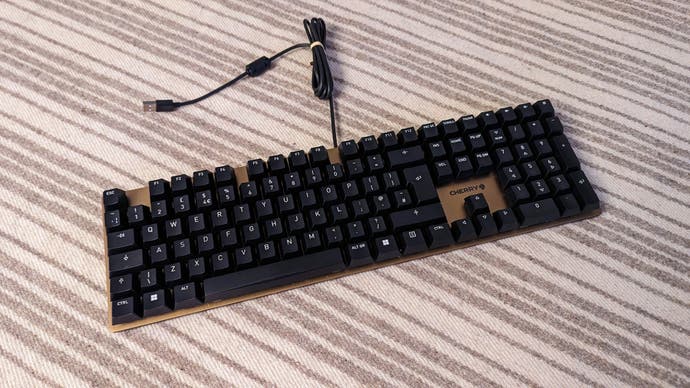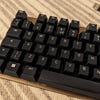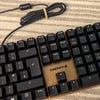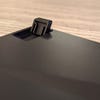Cherry's KC 200 MX keyboard perfectly demonstrates the firm's exciting new MX2A mechanical switches
The typing experience is faultless, though my (first) review unit isn't.
From the first few key presses, Cherry's £80/$90 KC 200 MX mechanical keyboard ably demonstrates the genius of the German firm's new MX2A switches - while being a fascinating but not faultless keyboard for typing or gaming in its own right.
These switches are undoubtedly the star of the show, and come with a genuine litany of improvements over the original Cherry MX designs that have appeared in basically every popular mechanical keyboard made in the last 13 years. The MX2A switches are smoother with "near contactless" movement, quieter, more uniform, longer-lasting, more eco-friendly... and less wobbly, scratchy or ping-y. This new switch even "boasts aesthetics" (direct quote) - and of course is available in the usual wide range of varieties, with MX Silent Red and MX Brown options available for the KC 200 MX itself.
Given that Cherry's original MX switch design dates back to the 1980s, it seems there were a lot of potential upgrades that could all be bundled together when it came time for the MX2A, and indeed as promised the new Silent Red switches in my review unit feel startlingly good: buttery-smooth with a deeper, quieter report, courtesy of fancy factory lubrication and a new barrel-shaped spring in contrast to the cylindrical shape it had before. I also got a chance to try the new Brown switches, which weren't as quiet or effortless to press as the Silent Red but perhaps better for typing given their extra tactile bump.
Given that these switches still use the familiar cross-shape stems on top to maintain compatibility with older keycaps, this is pretty impressive stuff. It feels like a genuine step forward versus the original Cherry MX designs - and an important one given how good and cheap Cherry MX "clones" have gotten over the years.
Interestingly, while the keyboard's switches are highly rated when it comes to longevity, the chassis of my review unit was damaged right out of the box. The bronze-coloured anodised metal plate that tops the chassis looks great and feels nice, but on this particular review unit that plate is seriously warped under the numpad. It's actually bowing out to the extent that the zero and period keys are noticeably pointing in different directions - and there's similar but less extreme damage under the space bar too.
I haven't dropped or otherwise damaged the keyboard since unboxing it a few days ago and it is, I think, a new unit, so this is a bit disappointing. I've never even seen similar damage on any number of other metal-topped keyboards that I've used in the past, so I'm a bit confused as to how this has happened.
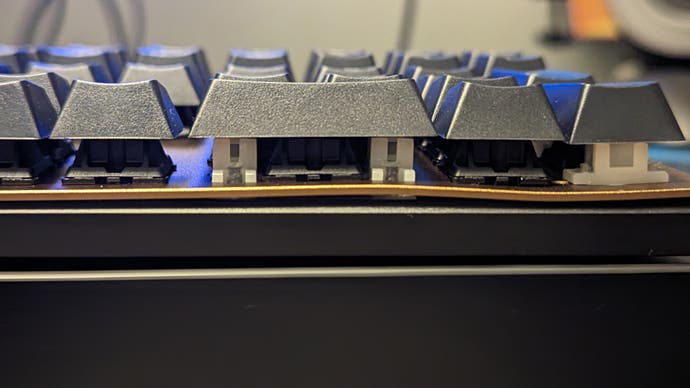
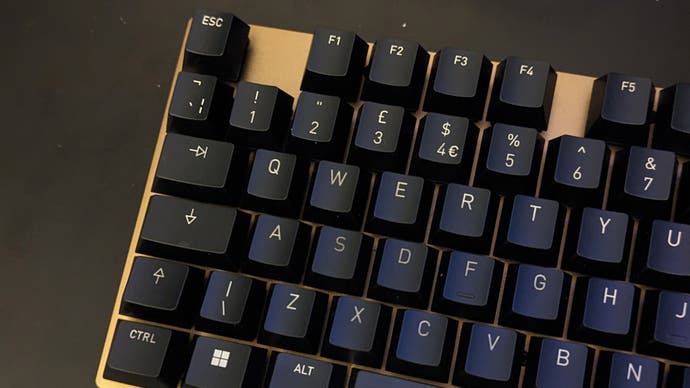
To Cherry's credit, they did send out a replacement review unit extremely quickly and it shows no signs of similar damage - and I did try lifting the metal chassis in the same area to see if was even possible to cause the damage intentionally, but the replacement held firm. I'm willing to chalk this up to bad luck for the moment, but I'll certainly be looking at other KC 200 MX reviews for similar damage.
There's some other weirdness too, although of no real importance in comparison. The keycap legends seem slightly different to me in terms of brightness, with some of the WASD keys already looking duller after a week or so of typing and a few lengthy Starfield sessions. I'm not sure whether this is just a trick of the light, natural variation, a manufacturing defect or even very early wear, but it doesn't fill with with a huge amount of confidence that these ABS keycaps will look great after a couple of years. For a typist's keyboard in 2023, I'd have loved to see more durable (and more expensive) PBT keycaps here instead.
Still, the KC 200 MX does have some nice features. The space bar is gently smoothed into a gentle curve in the centre, where your fingers are likely to make contact with it, mimicking the effects of the popular back-to-front mounting preferred by some enthusiasts. I like the inclusion of volume keys to fill out the available space above the numpad too, with status lights being integrated into the caps lock, num lock and scroll lock keys.
The keyboard also features full n-key rollover (NKRO; any keys can be pressed and recognised simultaneously), which is nice for gaming - particularly in rhythm games or in those rare titles that offer multiplayer co-op using a single keyboard.
One feature you won't find here is backlighting. The keyboard doesn't feature it, which is probably fine for office use but isn't great for home office use or for gaming, where I appreciate even a simple single-colour backlight to locate little-used keys in low ambient light conditions.
I appreciate that the keyboard is targeting a fairly aggressive £80/$90 price point - which would also explain the modest keycaps - but it's still worth noting for gamers and twilight typists, considering this keyboard is one of the easiest ways to test out Cherry's new switch innovations.
Ultimately though, while the KC 200 MX is a nice keyboard that feels fairly priced, I'm looking forward to testing these switches on other models (like Cherry's own Xtrfy K5V2) to see how they fare when paired with higher-grade case and perhaps fancier keycaps too. The typing experience is great already on the KC 200 MX, but I get the sense that a board with higher quality components elsewhere could take these super switches to the next level. And what's this I hear about some super special MX Purple switches..?
